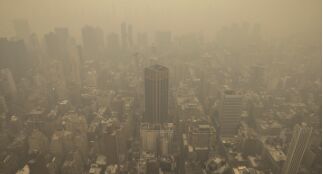"Republican Presidential Candidates at Odds Over Climate Change, Highlighting Party's Growing Divide
Divide within the Republican Party on climate change, with some candidates dismissing it as a hoax while others acknowledge its reality, the urgency and impacts of climate change, and the potential political consequences for the party.
Not a single hand went up during the debate, highlighting the divide within the Republican Party on the issue of climate change. While some candidates, like Florida Gov. Ron DeSantis, dismissed the question and attacked the media, others, such as former U.N. Ambassador Nikki Haley, acknowledged that climate change is real. This disparity within the GOP reflects the struggle to reconcile the rising concerns about climate change, especially among young people, with the party's older base, which largely rejects climate science as a liberal conspiracy theory.
Last night, not a single Republican raised their hand when asked whether they believe climate change is caused by humans.
— Adam Schiff (@AdamSchiff) August 24, 2023
Not one.
The petroleum industry owns them lock, stock and oil barrel.
It’s as pathetic as it is dangerous. pic.twitter.com/0DVsA9m3um
Scientists overwhelmingly agree that human activities, specifically the release of heat-trapping gases from the combustion of fossil fuels, are contributing to global warming and its detrimental effects on the environment and animal species. Some Republican leaders have recognized the need to address climate change to some extent. House Speaker Kevin McCarthy, for example, has proposed planting 1 trillion trees to help protect the environment. However, the GOP's presidential candidates remain skeptical of government-led actions to reduce emissions, a solution often endorsed by Democrats and environmental advocates. During the debate, Vivek Ramaswamy dismissed the climate change agenda as a hoax, emphasizing the supposed negative impacts of climate change policies. Surprisingly, none of his competitors challenged him directly on this issue, even as evidence was presented highlighting the major problems caused by climate change.
These problems include extreme weather events that have been increasingly occurring across the country and the world. From heavy rains in Cleveland and flooding in Detroit to wildfires in Canada creating smoky and polluted air in the United States, the effects of climate change are becoming more apparent and devastating. The heat, in particular, has reached record-breaking levels, with global temperatures exceeding modern equipment records. The world's oceans have also set records for heat, leading to the destruction of coral reefs in Florida.
The Republican Party's stance on climate change, or lack thereof, has drawn criticism from scientists and activists who argue that not acknowledging and addressing this issue is not only detrimental to the environment but also politically damaging. According to a recent poll, a majority of Americans believe that the federal government is not doing enough to mitigate climate change. Furthermore, there is a clear generational divide within the Republican Party, with younger Republicans expressing more concern and anxiety about climate change compared to their older counterparts.
Christopher Barnard, the president of the American Conservative Coalition, the largest conservative environmental group in the nation, stressed the importance of the GOP acknowledging the reality of climate change and offering some sort of solution. He believes that even a minimal acknowledgment can go a long way in appealing to voters who care about the environment. In conclusion, the debate among the Republican presidential candidates on climate change highlighted the division within the party. While some candidates dismissed the issue or labeled it a hoax, others acknowledged its reality.
The GOP's struggle to address climate change reflects the challenge of reconciling the concerns of young people and environmental activists with the party's older base. The impacts of climate change, such as extreme weather events and rising temperatures, are becoming more evident and urgent. The party's stance on climate change has drawn criticism and could potentially alienate voters, particularly women and younger generations. Overall, there is a growing recognition that the GOP needs to do better in addressing climate change and offering solutions.




